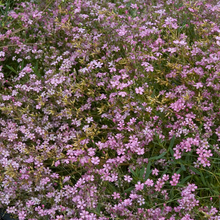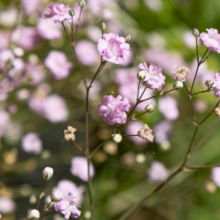Gypsophila repens 'Rosea', commonly known as pink creeping baby's breath, is a charming, low-growing perennial appreciated for its delicate pink blossoms and spreading growth habit. This Gypsophila cultivar displays slender, grey-green leaves and produces a profusion of small, star-shaped, rose-pink flowers in late spring and summer. Its ability to spread and its airy, light appearance make it a valuable addition to rock gardens, borders, and walls, adding a soft, rosy hue to various landscapes. It belongs to the Caryophyllaceae family.
Origin: Gypsophila repens originates from the mountainous regions of Europe. 'Rosea' is a cultivar selected for its pink flowers.
Light: Gypsophila repens 'Rosea' thrives when exposed to full sunlight. Optimal flowering occurs with at least six hours of direct sunlight each day.
Water: Regular watering is necessary, especially during dry periods and in the initial year after planting. Once established, it demonstrates some tolerance to dry conditions. Allow the soil to dry slightly between watering sessions to prevent root rot.
Soil: Gypsophila repens 'Rosea' performs best in well-drained, sandy, or rocky soils. It favors alkaline to neutral soil conditions. Avoid heavy clay soils that retain excessive moisture.
Fertilising: This plant is not a heavy feeder. A light application of a balanced, slow-release fertiliser in the spring is sufficient. Over-fertilising can lead to excessive foliage growth at the expense of flower production.
Pruning: Trimming the plant after flowering helps maintain a tidy appearance.
Pests and Diseases: Gypsophila repens 'Rosea' is generally resistant to pests and diseases, but watch for slugs and snails. Root rot can occur in poorly drained soil.
Uses: Gypsophila repens 'Rosea' is primarily cultivated for its attractive flowers and ground-covering capabilities. It is a popular choice for rock gardens, walls, edging, and containers.



